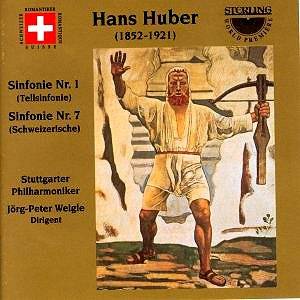The heritage and activities of the Swiss composer Hans
Huber straddled the nineteenth and twentieth centuries. His music is
resoundingly nineteenth century and positively romantic. This comes
as no surprise as his teacher was Carl Reinecke at Leipzig.
This of course is what you would expect of the First
Symphony which was written in 1882. Its four movements bounce and
lilt their way through a mixture of the dramatic and the bucolic. As
a rule of thumb think in terms of early Mahler and the Schumann of the
Fourth Symphony and the Overture, Scherzo and Finale. Add in
festive elements from Dvorak and Smetana and an infusion from Brahms'
Third Symphony (the latter a work yet to be written at the time Huber
finished this symphony). In the last movement the sense of direction
is only fitfully sustained but this is surely down to the composer rather
than conductor, Weigle. I did not find anything specifically Tell-like
about the music except that the dramatic episodes might well reflect
Tell's nationalist struggle against the Austrian invaders.
The Seventh Symphony was written during days
of high tragedy and political uncertainty. As the Great War moved crushingly
forward the Russian Revolution opened up new and threatening possibilities.
Like many works of that era the music seems oblivious or deliberately
opposed to the spirit of the times. Rather like the Tellsinfonie
this work, subtitled The Swiss, claims a nationalist theme.
According to Dominick Sackmann's outstandingly useful notes the programmatic
inspiration of the four movements is concerned with the mountains. Certainly
the 14 minute first movement Auf den Bergen has some tempestuous
moments (e.g. 11.43) which are tougher than anything to be found in
the Tellsinfonie. There is also a swirling grandeur which again
might suggest the alpine peaks. The gruff and brusque close to the first
moment is quite masterly. The second movement, a Ländlischer
Hochzeitszug, is bright and spirited. The music is celebratory
with some whooping work for the horns - a touch of Mahler and Goldmark
here and even Ludolf Nielsen in his orchestral suites. This is not the
mountain music of say Delius or even Richard Strauss but it has about
it far more of the atmosphere of the high places than either Hakon Børresen's
Second Symphony or Rubinstein's Ocean has of the sea. The third movement
runs the risk of sinking into a turgidly dense mellow string and brass
texture but overall it works well. The sunset fade of the third movement
ties in, most aptly, with the movement's title Abendstimmung in den
bergen. The finale shows that Huber had absorbed the language of
Schumann and Mahler into his blood stream. Huber ends the symphony well
and freshly. No standard farewell gestures for him!
Both works are most affectionately pointed and spun
by Weigle and the Stuttgarters who must know more about Huber and his
style than any other orchestra. This is after all their fourth Huber
disc for Bo Hyttner's Sterling company. Let us salute not only the valiant
and insightful Mr Hyttner but also the boardroom and cheque book support
of the lottery fund of Kantons Solothurn, the Czeslaw Marek Foundation
(a tactful supporter of many projects) and the Friends of the Stuttgart
Philharmonic. Without them this disc would not have existed.
Only two more symphonies (4 and 8) to come now. After
that perhaps we will get to hear Huber's concertos for piano, violin
and cello.
Huber does not have the impressionistic freshness of
two young victims of the Great War: George Butterworth (in his Shropshire
Lad) or Rudi Stephan (in his Music for Orchestra). That said,
a real creative imagination is at work but within the palette boundaries
of Raff, Schumann, Brahms and earlyish Mahler.
Rob Barnett
THE HUBER SYMPHONIES:-
No. 1 William Tell (1882)
No. 2 Böcklin (1900)
No. 3 Heroische (1902)
No. 4
No. 5 Der Geiger von Gmünde (1906)
No. 6 (1911)
No. 7 Schweizerisch (1917)
No. 8 Frühlings-Symphonie (1920)
See also review
of other symphonies by Rob Barnett

![]() Stuttgarter Philharmoniker/Jörg-Peter
Weigle
Stuttgarter Philharmoniker/Jörg-Peter
Weigle ![]() STERLING CDS-1042-2
[70.57]
STERLING CDS-1042-2
[70.57]